TABLE 17-9
What are the factors that determine the acceleration time (in sec.)from 0 to 60 miles per hour of a car? Data on the following variables for 171 different vehicle models were collected:
Accel Time: Acceleration time in sec.
Cargo Vol: Cargo volume in cu.ft.
HP: Horsepower
MPG: Miles per gallon
SUV: 1 if the vehicle model is an SUV with Coupe as the base when SUV and Sedan are both 0
Sedan: 1 if the vehicle model is a sedan with Coupe as the base when SUV and Sedan are both 0
The regression results using acceleration time as the dependent variable and the remaining variables as the independent variables are presented below. 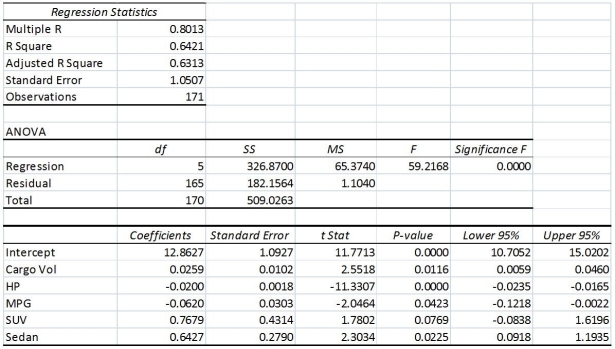 The various residual plots are as shown below.
The various residual plots are as shown below. 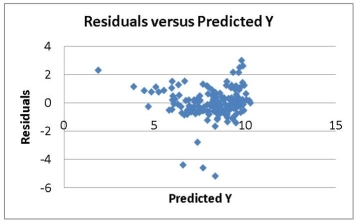
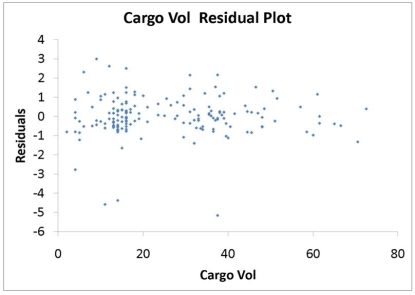
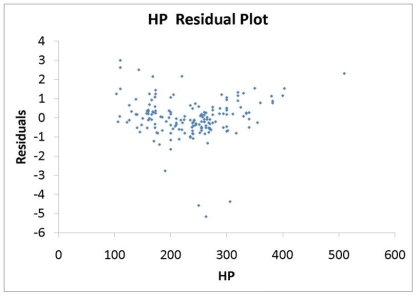
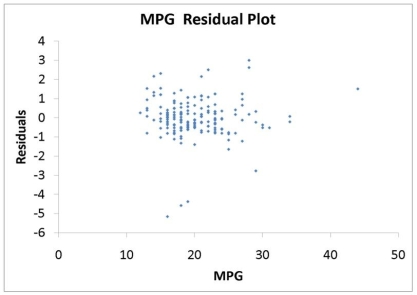
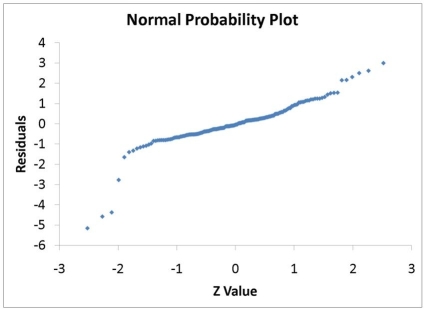 The coefficient of partial determination (
The coefficient of partial determination (  )of each of the 5 predictors are,respectively,0.0380,0.4376,0.0248,0.0188,and 0.0312.
)of each of the 5 predictors are,respectively,0.0380,0.4376,0.0248,0.0188,and 0.0312.
The coefficient of multiple determination for the regression model using each of the 5 variables Xj as the dependent variable and all other X variables as independent variables (  )are,respectively,0.7461,0.5676,0.6764,0.8582,0.6632.
)are,respectively,0.7461,0.5676,0.6764,0.8582,0.6632.
-Referring to Table 17-9,what is the p-value of the test statistic to determine whether Cargo Vol makes a significant contribution to the regression model in the presence of the other independent variables at a 5% level of significance?
Definitions:
Equals Sign
A symbol (=) indicating mathematical equality between two expressions.
Research Hypothesis
Another term for alternative hypothesis, indicating the expected outcome or belief regarding a study's findings.
Null Hypothesis
In statistical testing, it posits there is no effect or no difference, serving as the default or hypothesis to be tested.
Alternative Hypothesis
A hypothesis that contradicts the null hypothesis, suggesting there is a significant difference or relationship between variables.
Q13: Referring to Table 17-6,in terms of the
Q14: Bulimic women often<br>A)have unrealistic expectations about themselves<br>B)are
Q31: Referring to Table 16-15,what is the unweighted
Q45: Referring to Table 16-10,the value of the
Q82: True or False: Referring to Table 15-3,suppose
Q83: True or False: C<sub>p</sub> > 1 indicates
Q94: True or False: The C<sub>p</sub> index measures
Q124: True or False: The p chart is
Q171: Referring to Table 17-11,which of the following
Q263: Referring to Table 17-10 and using both